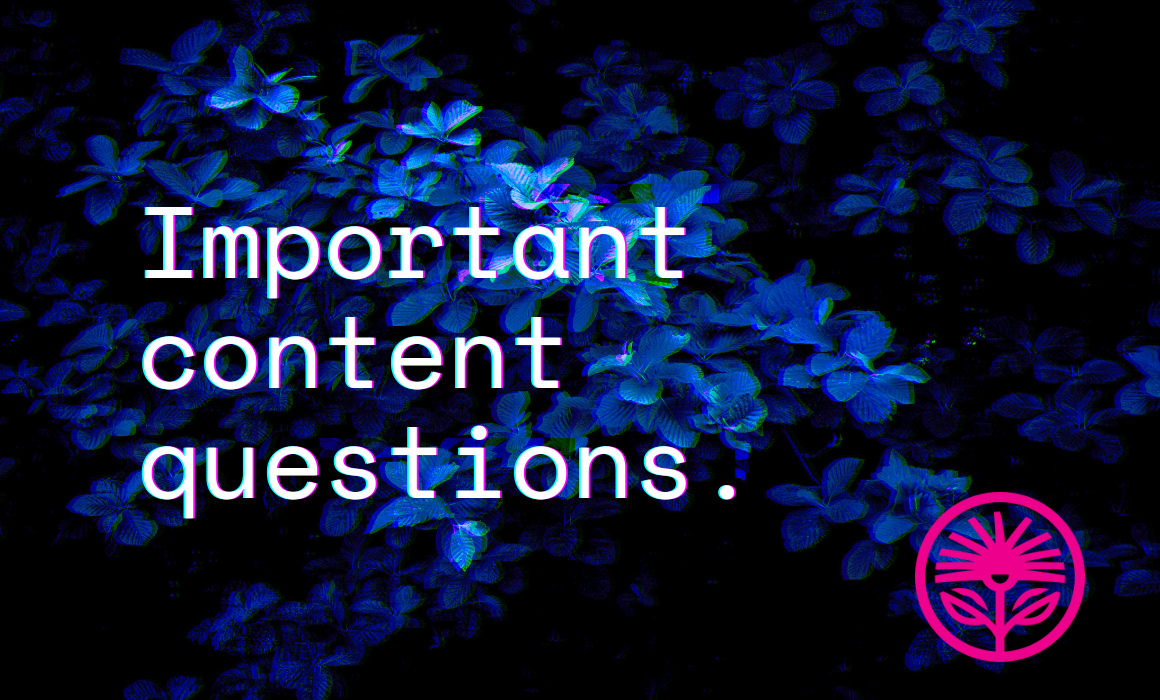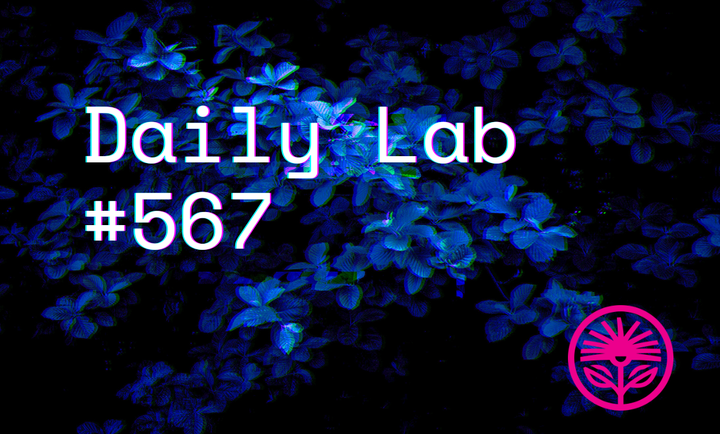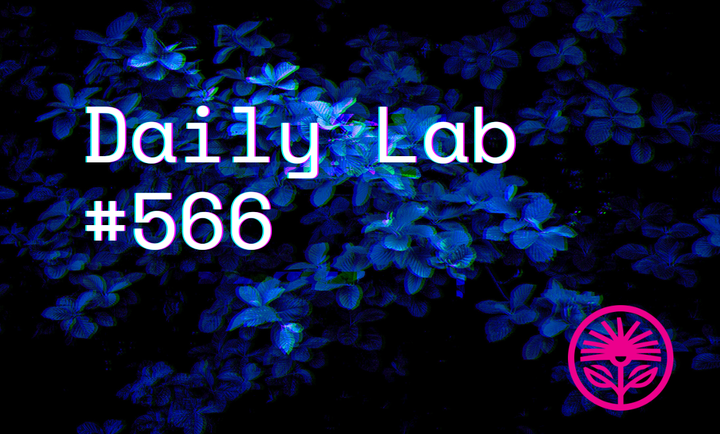The most important content questions — Kelford Labs Weekly
What I’ll ask if you ask me about content.

I wrote my first content strategy—for the small-circulation newspaper for a local industrial park, if you’re wondering how cool I am—almost 20 years ago.
I was managing influencer campaigns in the late-aughts. Heck, I was an influencer in quite a few campaigns in those early days, I recollect with mild confusion.
Flash forward to today and last week had me bouncing between making social content for one of Canada’s most recognized brands, counseling a Californian tourism destination on content strategy, and helping an independent consultant write their launch post.
I recount all this to a) Brag, obviously b) Explain why, when you ask me, “How do I start creating marketing content?”, I’ve got a few questions for you, too.
So that’s exactly what this week’s newsletter is all about: The questions I’ll ask you if you ask me how to create more marketing content.
“What don’t you do?”
“Resources are not limitless, and because time and space cannot be compressed, we live in a world of inescapable trade-offs.”
— Michael Raynor, The Strategy Paradox
Unless you are also adding resources—like additional team members—you can’t just add content marketing to your process.
Something has to give. Something has to go.
What will you be doing content instead of? What traditional or historical marketing efforts will you let go of to spend more energy and time on making content?
The single biggest problem I see is not starting a content project. It’s sticking to one.
Most organizations that start a blog end up stopping shortly thereafter. The same is true for newsletters, podcasts, or even social media engagement.
The first step toward failing at content is starting content—if you don’t stop something else first.
You’re not going to suddenly have more time to take on another big project, no matter how necessary or important you might believe it is.
So you need to know what you’re going to ditch to be able to stick to this.
“What focus means is saying no to something that with every bone in your body think is a phenomenal idea, and you wake up thinking about it, but you end up saying no to it because you’re focusing on something else.”
— Legendary Apple designer Jony Ive
Just as an example, my business doesn’t really do fancy pitches or presentations. That’s the thing we don’t have the time to do because we’re doing this instead.
And the good news is, because we do this, we don’t have to do that. Our newsletter, our writing, our public thinking is our pitch, it is our presentation.
Because we have so much content defining, articulating, and refining our process and position, we can be pretty insightful and inspirational in conversation.
Whatever your specific challenge, question, or situation, I’ve probably written a post about exactly that at some point in the last 500 I’ve published.
That makes up for our lack of flash or slides.
Of course, that’s just an example, you don’t have to make that choice.
You just have to make a choice.
“What do you know that no one else knows?”
“Being good at what nobody is doing is better than being great at what everyone is doing. But being an expert in something nobody is doing is exponentially more valuable.”
— Greg McKeown, Effortless
Once we’ve made time for content, we need to make content for, well, our content.
What are we going to make, and how?
That’s a big question, made easier by focusing on what we can do first. Instead of thinking about all the things we could do and getting paralyzed by the decision.
So, what do you simply know more about than everybody else?
The point is that you focus on what you’re best at—so you can be confident your content demonstrates value by delivering it.
Because of my specific experience, I know more a bit more about how to get started with marketing, how to stick with it, and how to make it work than almost anyone else. That means that’s what I write about:
“All perception is selective. We are all experts at discerning other people's patterns of selectivity. Our own are mercilessly hidden from us.”
— John Culkin
But how do we know what we know more about than anyone else?
We ask other people. We notice what they ask us. We notice the compliments and testimonials we get—and the ones we’d prefer to get—and what they talk about (or don’t).
While I might want people to ask me about my cool tech projects, my love of advertising history, or my nuanced opinions on arthouse cinema, the fact is they actually ask me about what they should say in their marketing.
So that’s what I write about.
So ask yourself: What questions do I get from prospects, customers, or colleagues?
In short, what are you known for knowing?
And how could you create content about that?
“What can you do endlessly?”
“The key element of an optimal experience is that it is an end in itself. Even if initially undertaken for other reasons, the activity that consumes us becomes intrinsically rewarding.”
— Mihaly Csikszentmihalyi, Flow
You know what you’re going to ditch. You know what you’re going to focus on.
Now, you need to know what you can stick with.
That’s how you decide whether you’re starting with a podcast or a newsletter. Whether it’s LinkedIn or Instagram.
Yes, you need to consider your audience, their preferences, and where they hang out. Absolutely.
But once you know that, the next thing is deciding how you’re going to interact with them. And that needs to be something you can stick with because you like it, not just because you think you should.
So don’t start a podcast if you don’t understand the equipment or aren’t excited to learn about it. Don’t go all-in on video unless you’re extremely interested in the art and science of the moving image. Don’t start a blog if you don’t enjoy the act of writing.
The secret to sticking with something—anything—is liking it.
Everything else—discipline, optimization, improvement—are downstream of enjoying the process.
“If you’re striving for excellence—whether it’s in playing the guitar or flying a jet—there’s no such thing as over-preparation. It’s your best chance of improving your odds.”
— Chris Hadfield, The Astronaut’s Guide to Life on Earth
Getting good at making content takes time. It takes many attempts before it starts to work. We need to give ourselves the chance to actually get better, the chance to actually make it work.
Before there is marketing performance, there is marketing practice. We can’t expect immediate results, so we must expect long-term effort.
Marketing rarely fails—it usually just stops. And content stops more often than most other efforts. Because entrepreneurs and marketers see the results others are getting but they don’t see the effort. So they jump in too quickly, too eagerly, and too optimisticly.
And when it gets tough, when it gets dull, when it gets deprioritized, it eventually just goes away. And then they’re back, exactly where they were before, with only wasted time to show for it.
So, remember, give yourself 10 more tries if you start to falter or get frustrated.
Pace yourself, and only do what you can do forever.
And make content that works even if nobody else ever sees it.
That’s how you make content that you’ll keep working at.
And those are the questions I’d ask you if you asked me what type of content you should make.
So, what are you going to make?
Kelford Inc. shows you the way to always knowing what to say.



